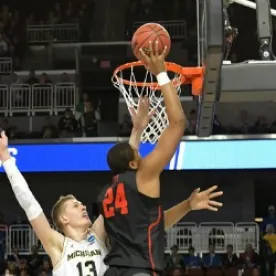The NCAA has lost an additional federal court battle on name, image, and likeness (NIL) compensation for student-athletes just days after the U.S. Supreme Court’s unanimous decision confirming the Ninth Circuit’s ruling that the NCAA’s limitation on education-related benefits for student-athletes violates federal antitrust laws.
In its latest legal loss, U.S District Court Judge Claudia Wilken, the federal district judge who presided over both the Alston case and Ed O’Bannon antitrust cases, denied the NCAA’s request to dismiss any of the claims in the lawsuit seeking to eliminate any NCAA rules blocking a student-athletes ability to profit from their NIL and allowing student-athletes ability to challenge NCAA rules preventing them from securing a portion of the rights fees received by the NCAA from group licensing revenues from the broadcasting of college sports.
"Judge Wilken rejected the NCAA’s motion that the claims asserted in this action have already been ruled upon in prior antitrust litigation"
The class action lawsuit, filed in June 2020 on behalf of Arizona State University swimmer Grant House and Oregon women’s basketball player Sedona Prince, will continue. The lawsuit seeks to prevent the NCAA from using any bylaws or rules to allow their college and university members to “restrict the amount of name, image, and likeness compensation available” to athletes. It challenges rules prohibiting athletes from being paid for sponsorships or endorsements, being paid for social media influencer sponsorships and using their NIL to promote their own businesses, along with rules that prohibit them from sharing in television revenue made by schools and conferences through group licensing.
The action also seeks unspecified damages, which could be result in treble damages in the hundreds of millions, based on the share of television-rights money and the social media earnings the plaintiffs claim athletes would have received if the NCAA’s current restriction on NIL compensation had not existed. The suit seeks to cover athletes who played in the last four years through those who play through the date of a final judgment.
When the lawsuit was filed, House alleged the NCAA puts college athletes who are shooting for the Olympics at a huge disadvantage. He stated, “[W]hile Olympic athletes rely heavily on endorsements to afford the cost of competing and training, the NCAA shuts us out of the opportunity entirely.”
"Judge Wilken rejected the NCAA’s argument that prior judicial decisions fail to support the claim that student-athletes should be able to make a claim to be compensated for the use of their name, image and likeness in live broadcasts."
She held that the athletes had raised “sufficient” allegations against the rules denying them television revenue in that they “raise the reasonable inference that competition among schools and conferences would increase in the absence of the challenged rules, and that this increased competition would incentivize schools and conferences to share their broadcasting and other commercial revenue with student-athletes even if the student-athletes lacked publicity rights in broadcasts.”
Judge Wilken further supported her dismissal of the NCAA’s motion to dismiss by stating that to establish injury “a plaintiff need not establish that it has a legal entitlement to the compensation in question.” Rather, a “plaintiff can show that it was injured in fact by alleging that it was deprived of the opportunity to receive compensation it otherwise would have received but for the challenged conduct.”




 />i
/>i

